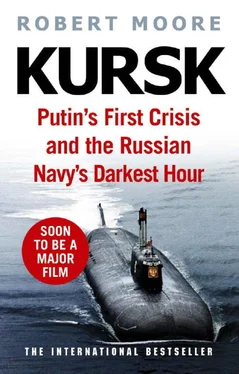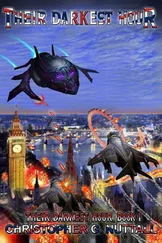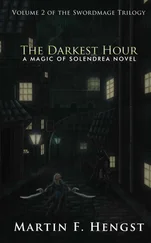The Kursk crew came from many different parts of Russia. Some hailed from the traditional maritime cities along the Baltic and the Crimea, others from inland towns and villages scattered across the steppes. They had first met at submarine training colleges in St Petersburg or Sebastopol, and they had forged close friendships, personal bonds that transcended all other loyalties.
Among those serving in the aft compartments, alongside Kolesnikov, were Sergei Lybushkin and Rashid Ariapov. All aged twenty-eight and sharing the rank of captain-lieutenant, the three men were inseparable. They had known one another since cadet school, and after graduating they had requested that they serve together. At first, the friends were sent to different bases on the Kola Peninsula, but they had badgered their commanders until the Fleet assigned them to the same base. By sheer good fortune, they ended up in the same submarine.
The Kursk crew was linked not just by friendship but also by a complex mix of emotions. They were patriotic and believed in the need to defend the Russian nation, but they also shared a brewing anger and frustration. Many saw their principal day-to-day enemy not as the West, but their own corrupt military bureaucracy, and several members of the Kursk crew loyally served in the submarine even while they took legal action against the Northern Fleet. Andrei Rudakov, the Kursk ’s senior communications officer, was pursuing a case in Vidyaevo’s military tribunal, demanding that the submarine crew be paid their salaries on time. For several years, he had also been attempting to sue the Navy for lost pay during the mid-1990s. Unable to afford a lawyer, he had studied military law in the evenings so that he could handle the case himself and provide assistance to his crew-mates. Far from being discouraged by senior officers, Rudakov was surprised to receive the open support of commanders on the base, including Gennady Lyachin.
The issue of pay was one that worried commanders as much as their crews. After returning from one recent patrol, the Kursk sailors had gone to the Salaries Office in Vidyaevo to pick up their cheques and been told that the wages owed them could not be paid – there was no money left in the bank. Lyachin was determined that would not happen again. So, as the sailors gathered on the pier on 10 August, he ordered a midshipman to stay ashore, charged with the task of collecting the crew’s salaries on pay-day, before the Navy had time to divert the money to other uses. The least his men deserved when they returned was a salary.
The pitiful wages did not reflect the sacrifices the men made. The commander of a nuclear submarine in the Northern Fleet was earning the same money as a tram driver in Moscow. Captain-Lieutenant Dmitri Kolesnikov earned a salary of 2,700 roubles a month, the equivalent of just over $1,000 a year. He received a token increase when at sea, and had been granted a bonus of just $100 for his three-month mission to the Mediterranean in 1999.
His father’s generation of submariners was sustained by communist faith and a set of privileges that gave their profession meaning and respect. Now both the ideology and the rewards had vanished, and the young naval officers were motivated primarily by loyalty to one another.
Many had signed up – like sailors all over the world – to improve their education and to escape the crushing boredom of life in the provinces. These young men wanted to strike out on their own, to see something of Russia beyond the grim monotony of hometown life.
The navy was a path to opportunity. It might offer a harsh life – living in a bleak military base in the Arctic Circle and serving in the claustrophobia of a submarine – but compared with where these young men had grown up, in communities blighted by alcoholism and economic decay, the Northern Fleet represented freedom.
III: 10.00 a.m., THURSDAY, 10 AUGUST
Ara-Guba Bay
The Kursk was gently manoeuvred away from Vidyaevo’s Pier Number Eight by two weather-beaten tugs. The bay was tranquil, bathed in a watery sun, and with a gentle breeze blowing from the north. A small swell slapped across the tiles on the steel hull, barely noticeable.
She was one of a dozen submarines in the Seventh Division that came under the command of the First Flotilla. The division commander was away on holiday that week, and his deputy, Captain Oleg Yakubin, commander of another submarine, was on duty. Yakubin had glimpsed the final preparations for departure as he worked from his office overlooking the dock. In one glimpse, he had noticed the mooring lines being thrown back onto the pier. The next time he looked out of his window, the pier was empty, and out in the bay, edging towards the open sea, the Kursk stood, ink-black against the sea, her upper rudder rising from the water like the tail of a whale.
Once out of the Ara-Guba Bay and past the little settlement of Port Vladimir, founded by traders at the end of the nineteenth century, Captain Lyachin ordered the Kursk to dive to periscope depth and head due east to join the final phase of the Fleet exercise. He must have been greatly relieved to be under way, for the preceding days had been plagued with maddening bureaucratic tangles. When Lyachin had docked the submarine at the loading pier in the nearby port of Zapadnaya Litsa to take on the practice torpedoes, they were not ready. When the torpedoes finally arrived, the crane needed to load them was broken. After hours of delays, another crane was finally used, and the Kursk took on both the torpedoes and a full complement of twenty-four Shipwreck cruise missiles, each gingerly lowered into the tubes on either side of her double hulls. Although the Kursk was only participating in an exercise, she still took on her warload of weapons. She was one of an elite group of submarines kept ready at all times for combat operations.
The ‘weapons fit’ of a submarine – the exact configuration of missiles and torpedoes carried on a particular deployment – is regarded as an important military secret. The Kursk ’s official ‘table of arms’ for that day showed that when she set sail, in addition to the Shipwrecks she was carrying eighteen torpedoes, including a mix of SS-N-15 Starfish missiles, fired through the smaller 533mm torpedo tubes, and heavier SS-N-16 Stallion missiles, launched through the 650mm tubes. Two of the regular torpedoes had been converted for training purposes, fitted with flotation devices and dummy warheads.
Lyachin knew that the Kursk would not be alone under the waves. Three other Russian submarines were part of the exercise, and he also suspected that there would be another unidentified boat, a British or American submarine on patrol, keeping an eye on the exercise. With a further thirty warships and auxiliary vessels taking part, watched over by a couple of Western surface spy ships, the shallow Barents Sea would be unusually crowded.
I: AUGUST 2000
Northern Fleet Headquarters, Severomorsk
Summer war games in the Barents Sea date back as far as any officer can remember. Even in the darkest years, during the mid-1990s, when fuel was in critically short supply, the Fleet command managed to choreograph small exercises.
The year 2000 was going to be different. Plans were in place for manoeuvres on a scale not seen since the collapse of the Soviet Union a decade earlier. The Northern Fleet admirals were eager to impress the newly elected Russian president, Vladimir Putin, who had come to power promising to boost the prestige and morale of the military. Even better, Putin had grown up in St Petersburg, the birthplace of the Russian Fleet, and it was widely hoped he would seek to restore naval pride. Several sycophantic gestures were made by the admirals in an attempt to curry favour with the young president, including firing a ballistic nuclear missile from a submarine to ‘celebrate’ his election.
Читать дальше












